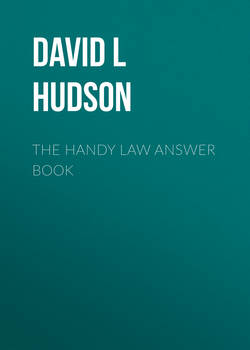Читать книгу The Handy Law Answer Book - David L Hudson - Страница 57
На сайте Литреса книга снята с продажи.
What does the Constitution say about ex post facto laws?
ОглавлениеArticle I, Section 10 prohibits Congress from passing ex post facto laws, which essentially are laws that have a retroactive and detrimental impact on individuals. Ex post facto laws are those which make conduct a crime even if the conduct was legal when originally committed. The U.S. Supreme Court explained the types of ex post facto laws in Calder v. Bull (1798):
I will state what laws I consider ex post facto laws, within the words and the intent of the prohibition. 1st. Every law that makes an action, done before the passing of the law, and which was innocent when done, criminal; and punishes such action. 2nd. Every law that aggravates a crime, or makes it greater than it was, when committed. 3rd. Every law that changes the punishment, and inflicts a greater punishment, than the law annexed to the crime, when committed. 4th. Every law that alters the legal rules of evidence, and receives less, or different, testimony, than the law required at the time of the commission of the offence, in order to convict the offender. All these, and similar laws, are manifestly unjust and oppressive.
LegalSpeak: Katzenbach v. McClung (1964)
Moreover there was an impressive array of testimony that discrimination in restaurants had a direct and highly restrictive effect upon interstate travel by Negroes. This resulted, it was said, because discriminatory practices prevent Negroes from buying prepared food served on the premises while on a trip, except in isolated and unkempt restaurants and under most unsatisfactory and often unpleasant conditions. This obviously discourages travel and obstructs interstate commerce for one can hardly travel without eating. Likewise, it was said, that discrimination deterred professional, as well as skilled, people from moving into areas where such practices occurred and thereby caused industry to be reluctant to establish there.
We believe that this testimony afforded ample basis for the conclusion that established restaurants in such areas sold less interstate goods because of the discrimination, that interstate travel was obstructed directly by it, that business in general suffered and that many new businesses refrained from establishing there as a result of it. Hence the District Court was in error in concluding that there was no connection between discrimination and the movement of interstate commerce. The court’s conclusion that such a connection is outside “common experience” flies in the face of stubborn fact.
It goes without saying that, viewed in isolation, the volume of food purchased by Ollie’s Barbecue from sources supplied from out of state was insignificant when compared with the total foodstuffs moving in commerce. But, as our late Brother Jackson said for the Court in Wickard v. Filburn (1942): “That appellee’s own contribution to the demand for wheat may be trivial by itself is not enough to remove him from the scope of federal regulation where, as here, his contribution, taken together with that of many others similarly situated, is far from trivial”….
This Court has held time and again that this power extends to activities of retail establishments, including restaurants, which directly or indirectly burden or obstruct interstate commerce. We have detailed the cases in Heart of Atlanta Motel, and will not repeat them here.
The appellees contend that Congress has arbitrarily created a conclusive presumption that all restaurants meeting the criteria set out in the Act “affect commerce.” Stated another way, they object to the omission of a provision for a case-by-case determination—judicial or administrative—that racial discrimination in a particular restaurant affects commerce…. Here, as there, Congress has determined for itself that refusals of service to Negroes have imposed burdens both upon the interstate flow of food and upon the movement of products generally. Of course, the mere fact that Congress has said when particular activity shall be deemed to affect commerce does not preclude further examination by this Court. But where we find that the legislators, in light of the facts and testimony before them, have a rational basis for finding a chosen regulatory scheme necessary to the protection of commerce, our investigation is at an end. The only remaining question—one answered in the affirmative by the court below—is whether the particular restaurant either serves or offers to serve interstate travelers or serves food a substantial portion of which has moved in interstate commerce.
Confronted as we are with the facts laid before Congress, we must conclude that it had a rational basis for finding that racial discrimination in restaurants had a direct and adverse effect on the free flow of interstate commerce….
The power of Congress in this field is broad and sweeping; where it keeps within its sphere and violates no express constitutional limitation it has been the rule of this Court, going back almost to the founding days of the Republic, not to interfere. The Civil Rights Act of 1964, as here applied, we find to be plainly appropriate in the resolution of what the Congress found to be a national commercial problem of the first magnitude. We find it in no violation of any express limitations of the Constitution and we therefore declare it valid.
